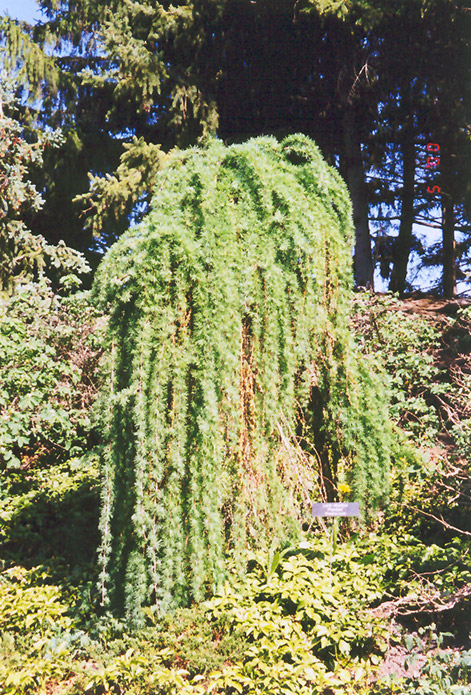Height: 4 feet
Spread: 4 feet
Sunlight:
![]()
Hardiness Zone: 3
Other Names: Common Larch, European Larch
Description:
An unusual small accent shrub for the garden with a strongly weeping habit, usually grafted on a standard to a certain height; best used as a solitary (not in groups) or accent in a garden composition, will definitely draw the eye to it
Ornamental Features
Weeping Larch is primarily valued in the landscape or garden for its highly ornamental weeping form. It has rich green evergreen foliage which emerges light green in spring. The needles turn an outstanding gold in the fall, which persists throughout the winter. The rough gray bark and gold branches add an interesting dimension to the landscape.
Landscape Attributes
Weeping Larch is an evergreen shrub with a strong central leader and a rounded form and gracefully weeping branches. It lends an extremely fine and delicate texture to the landscape composition which can make it a great accent feature on this basis alone.
This shrub will require occasional maintenance and upkeep, and usually looks its best without pruning, although it will tolerate pruning. Deer don't particularly care for this plant and will usually leave it alone in favor of tastier treats. It has no significant negative characteristics.
Weeping Larch is recommended for the following landscape applications;
- Accent
- General Garden Use
Planting & Growing
Weeping Larch will grow to be about 4 feet tall at maturity, with a spread of 4 feet. It has a low canopy. It grows at a medium rate, and under ideal conditions can be expected to live for 50 years or more.
This shrub should only be grown in full sunlight. It is quite adaptable, prefering to grow in average to wet conditions, and will even tolerate some standing water. It is not particular as to soil type or pH. It is somewhat tolerant of urban pollution. This is a selected variety of a species not originally from North America.
